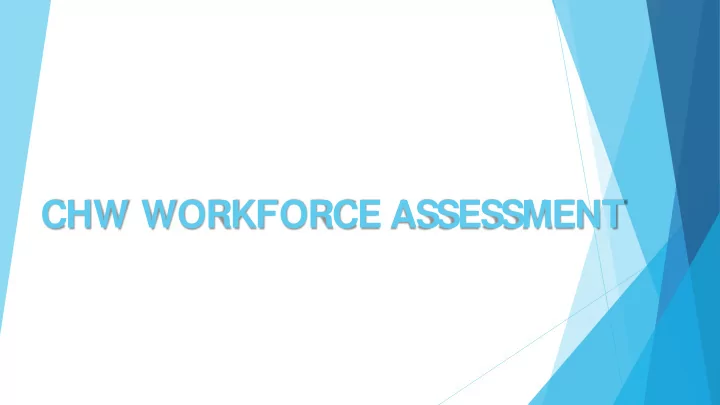

CHW WORKFORCE ASSESSMENT
Community Health Workers: Integral Members of Oregon’s Health Workforce Results of 2018 statewide needs assessment conducted by the Oregon Community Health Workers Association (ORCHWA) Funded by the Oregon Health Authority and Health S hare of Oregon
Background Community Health Workers (CHWs) are trusted community members who work to improve health through a variety of strategies. They have been an integral part of the health workforce in Oregon since the 1960s. In the context of health care reform, CHWs (also called promotores/ as de salud and Community Health Representatives) have received increasing recognition for their unique ability to improve health and reduce health inequities.
Methods The needs assessment used four methods: Analysis of data from the Traditional Health Worker Registry Discussion groups with 240 CHWs and allied workers from around the state Online CHW survey (104 respondents) Online employer survey (25 respondents)
Selected Findings Data sources indicate a need to: Increase representation of CHWs in all communities affected by inequities Provide education for other health professionals (especially supervisors) about CHW roles and scope Create a coordinated, statewide infrastructure for CHW training that is based on best practices and builds capacity around the state Provide clear guidance about payment mechanisms and approved billing codes in order to diversify funding beyond grants S pread the CHW paradigm— which is community-focused, non-hierarchical and values life experience— throughout the health system and dominant culture systems
Recommendations
CHW Roles and Scope of Practice The S tate should: Widely disseminate the approved scope of practice (S OP) of CHWs. Encourage programs to use the S OP as the basis for position descriptions. S upport CHWs to play a full range of roles, including roles as advocates and community organizers.
Training and Education The S tate and CCOs should support the development of a coordinated training system to equitably serve CHWs around the state. The system should emphasize training individuals with existing connections to communities most affected by inequities— and ideally, those already serving those communities, with or without pay. The THW Commission should actively support the development of advanced training options to promote CHWs’ professional development.
CHW Supervision The S tate should: Make high-quality, accessible training available for CHW supervisors, focusing on experienced CHWs who aspire to become supervisors. This training should include a thorough orientation to the history, roles, competencies and values of the CHW model. Disseminate clear guidelines about the nature and frequency of CHW supervision, and assure it is reflective and trauma-informed.
CHW Integration into the Health System CHWs should be recognized as full members of the clinical team. The S tate and CCOs should provide ongoing education to other health professionals about the history, roles and contributions of CHWs and the population-based public health paradigm that guides CHW work. CCOs and health systems should provide CHWs in clinical settings with access to the electronic health record (EHR), allowing them to contribute to care plans. CCOs and health systems should provide support for CHWs employed by community-based organizations by contracting with employers for their services.
Funding and Payment Models The S tate should: Provide clear guidance about CHW payment mechanisms. This should include approval of billing codes for CHWs and emphasize capitated and Alternative Payment Model (APM) options. Provide funding to support community-based CHW programs that cannot be sustained through health-system reimbursement. Mandate an equitable level of compensation and benefits for CHWs in state- supported programs.
Professional Development The S tate should encourage colleges and universities to work with community-based training providers to allow them to grant academic credit for trainees at reduced rates. The S tate should encourage CHW programs to develop internal and external career ladders that allow CHWs to achieve higher levels of pay and responsibility as they gain experience. The S tate, CCOs and health care systems should partner with ORCHWA to develop regional CHW resource centers. The Office of Equity and Inclusion should improve support for CHW certification applicants.
Evaluation of CHW Programs The S tate should: Encourage CHW programs to adopt the process and outcome indicators developed by the CHW Common Indicators Proj ect. Encourage use of community-based, participatory evaluations that build capacity in the marginalized communities where CHWs primarily work. Mandate that CCOs de-emphasize short-term, individually focused incentive metrics in favor of longer-term, community-level metrics.
Questions? For more on the CHW S tudy, see the S ummary Report and Full Report. Or contact ORCHWA at info@ orchwa.org or 855-445-2497.
Recommend
More recommend